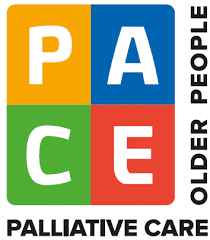
PACE Objectives and methods
- Map and classify existing palliative care systems in long term care facilities in terms of structures, organizations and policies for palliative care, we collect country data via country representatives from all parts of Europe using a survey and documentary analyses;
- Compare effectiveness of health care systems with and without formal palliative care structures in long term care facilities in six EU countries (BE, UK, IT, FI, PL, NL) in terms of patient and family outcomes – quality of dying, quality of life– quality of palliative care, and cost-effectiveness, and in terms of staff knowledge, practices and attitudes, we perform a representative cross-sectional study of deaths in 48 long term care facilities in each country, identifying at least 1,152 deceased residents across countries;
- Compare the impact of a health service intervention ‘Route to Success’ – aimed to improve the qualityof palliative care in long term care facilities – with traditional care (as control) in long term care facilities in Europe, on patient, family and staff outcomes (WP3-WP4) and on cost-effectiveness (WP5), we perform a controlled cluster trial (STUDY II), randomly allocating four long term care facilities (selected from study I) to intervention and four to control in each of the six countries. We evaluate the implementation process and measure the impact of the intervention after a 15-month trial period, on an estimated number of 240 deceased residents across countries;
- Consider differences between population groups, and based on results of study I and study II, we investigate the effects of gender, age, socio-economic status, dementia and functional status across health care systems, and identify what type of care works best for which patient group;
- Assist policy and decision-makers at national and international level in making informed and evidence-based decisions regarding best palliative care practices in long term care facilities, we develop products/tools for policy and decision-makers based on the study results, ultimately aiming to optimize the delivery of healthcare to the large proportion of EU citizens living and dying in old age, as explicitly addressed in the call.
Role of AGE Platform Europe
- Voice older people organisations’ experiences and concerns in the field of palliative and end of life care in residential care facilities, to inform the project results. To achieve that aim, AGE is responsible to organise meetings of a User forum
- Share progress made and results from the project with policy and decision makers, and draft policy recommendations at the end of the project. To achieve that aim, AGE is responsible to organise a mid term policy conference and a final conference, and to prepare, based on the debates and reflections, the policy recommendations.
More information on the project
- Project website: https://www.eupace.eu/
- Contact persons in AGE : Borja Arrue Astrain, borja.arrue@age-platform.eu and Nhu Tram nhu.tram@age-platform.eu






